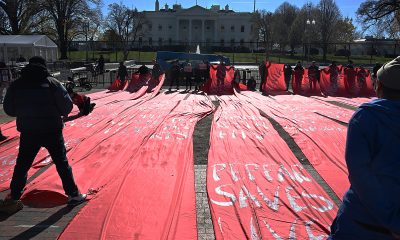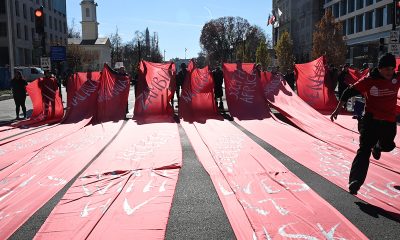National
Iraq war vet who fought ‘Don’t Ask’ dies in car accident
Manzella discharged under military’s gay ban after coming out on ’60 Minutes’
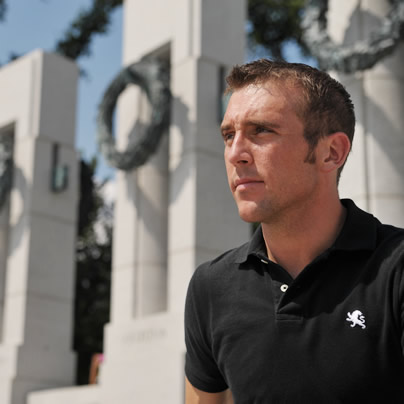
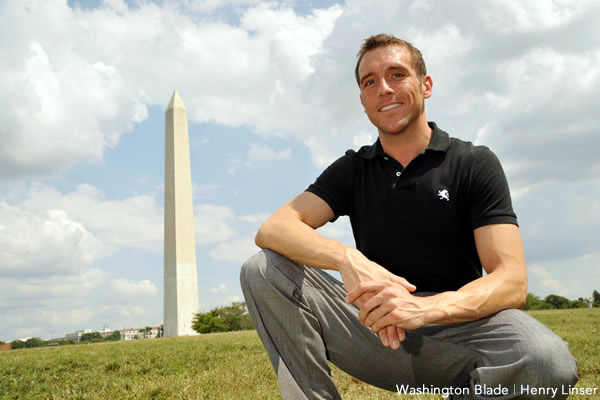
Darren Manzella, shown here in 2008, came out as gay while serving in the Army under “Don’t Ask, Don’t Tell.” He died at age 36. (Washington Blade file photo by Henry Linser).
A gay veteran of the Iraq war who fought against “Don’t Ask, Don’t Tell” has died in a car accident in Pittsford, N.Y.
Darren Manzella, who came out as gay in 2007 while serving in the Army during an interview on CBS’ “60 Minutes,” died on Thursday at the scene of the crash. He had just turned 36 on Aug. 8.
Steve Ralls, the former spokesperson for Servicemembers Legal Defense Network who handled his public relations at the time, said openly gay troops currently serving around the world today are able to do so, in part, because of Darren’s sacrifice.
“Darren knew he would be discharged for speaking out, but he volunteered to do it because he wanted the men and women who followed him to be able to serve openly without fear of discharge or discrimination,” Ralls said. “That’s the kind of guy, and the kind of soldier, Darren was. I know how deeply proud his family was of him, and that pride was shared by all of us who had the privilege of working with him, too.”
Manzella served as an Army medic in Kuwait and Iraq and earned a Combat Medical Badge for treating his fellow soldiers. His “60 Minutes” interview was filmed, in secret, in Kuwait City while he was still a Staff Sergeant in the Army.
He was the first openly gay service member on active duty to speak to the press from a war zone. Months after coming out publicly, Manzella was given an honorable discharge under the military’s gay ban in 2008.
Since August 2011, Manzella had been working as a health science specialist for the Department of Veterans Affairs in Rochester. According to his Facebook page, he very recently married his spouse, Javier Lapeira, on July 5.
Retired Air Force Lt. Col. Victor Fehrenbach, who also faced discharge under “Don’t Ask, Don’t Tell” for being gay, knew Manzella and said he was an inspiration.
“Darren Manzella wasn’t just a hero and an inspiration to me personally, he was an American hero and a civil rights leader,” Fehrenbach said. “When my ordeal started in May 2008, I saw Darren’s interview on 60 minutes. He inspired me to speak out and tell my story. He had such a great impact in the repeal of DADT.”
Fehrenbach, who was ultimately able to stay in the Air Force before he retired on his own volition, said his friend will leave a lasting legacy.
“The only blessing is that Darren died as a soldier and a husband,” Fehrenbach said. “He was able to fulfill his dreams to serve his country openly and marry the man he loved. I will miss him dearly, and I will never forget him. He made the world a better place and he made me better and stronger for knowing him.”
The Rochester-based Democrat and Chronicle quotes Michael Manzella, Darren’s father, as identifying his son as a person who was killed in the accident Thursday night.
Michael Manzella reportedly said Darren was struck by a sport utility vehicle while pushing his car that was already damaged in an accident that happened immediately beforehand on Interstate 490. Michael Manzella is quoted as saying as of Friday afternoon, his calls to police so far haven’t been returned.
In the same report, Cpl. John Helfer of the Monroe County Sheriff’s Office reportedly confirmed an accident involving two collisions took place on Thursday that caused someone’s death. However, Helfer reportedly wouldn’t name the person.
Helfer reportedly said the incident began as a two-car crash on the westbound lanes of the highway in Pittsford, when one car sideswiped another car about 8:30 p.m. The man in the struck car stopped in the middle lane of I-490, got out and started pushing it from behind, Helfer was quoted as saying.
But a sport utility vehicle rear-ended the car, pinning the man between the two vehicles. The man was pronounced dead at the scene, Helfer reportedly said. The other two involved drivers were reportedly taken to Strong Memorial Hospital with minor injuries.
Lapeira told the Blade the police came to his apartment to notify him that they had found Manzella’s car and his body, which remained at the Medical Examiner in Rochester until Saturday.
“Needless to say, Darren was a hero in every sense of the word,” Lapeira said. “Even at the moment of his death, his first instinct was to push his car off the freeway to avoid any injuries to others.”
After coming out on “60 Minutes,” Manzella was discharged months later under the military’s gay ban known as “Don’t Ask, Don’t Tell.” President Obama signed legislation to repeal that law in December 2010 and lifted the ban the following year.
In January 2008, the Washington Blade published an article — the first byline in the paper for this reporter — on Manzella’s appearance on “60 Minutes” during a period of uncertainty on whether he’d be expelled from the military. After he was subsequently kicked out of the Army under “Don’t Ask, Don’t Tell,” the Blade followed up in July 2008 with an article on his experience.
At the time, the former soldier told the Blade during his discharge proceedings he had the opportunity to request a board to rebut statements that he made to the press. But Manzella waved this option.
“I said I wouldn’t take back anything,” he said. “It would defeat the purpose of why I participated in the [“60 Minutes”] segment. It would defeat the purpose of working with SLDN.”
The former soldier told the Blade experience of being out in the military, making media appearances and ultimately being discharged from service has made him “much more aware” of his identity.
“My belief that ‘Don’t Ask, Don’t Tell’ needs to be repealed has magnified significantly because I’m personally affected by it now,” he said.
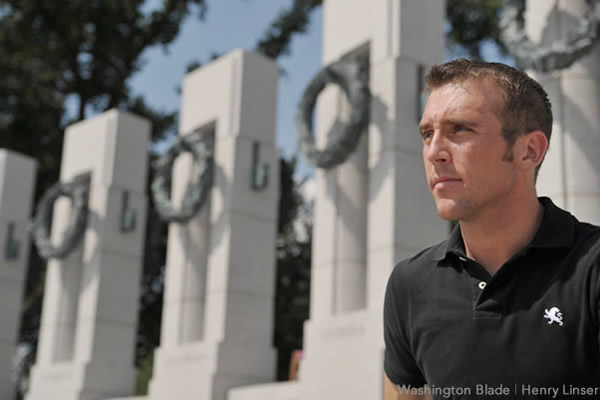
Darren Manzella in 2008. (Washington Blade file photo by Henry Linser)
National
Lawmakers warn of HIV crisis as federal support collapses
NMAC hosted Capitol Hill event on Wednesday
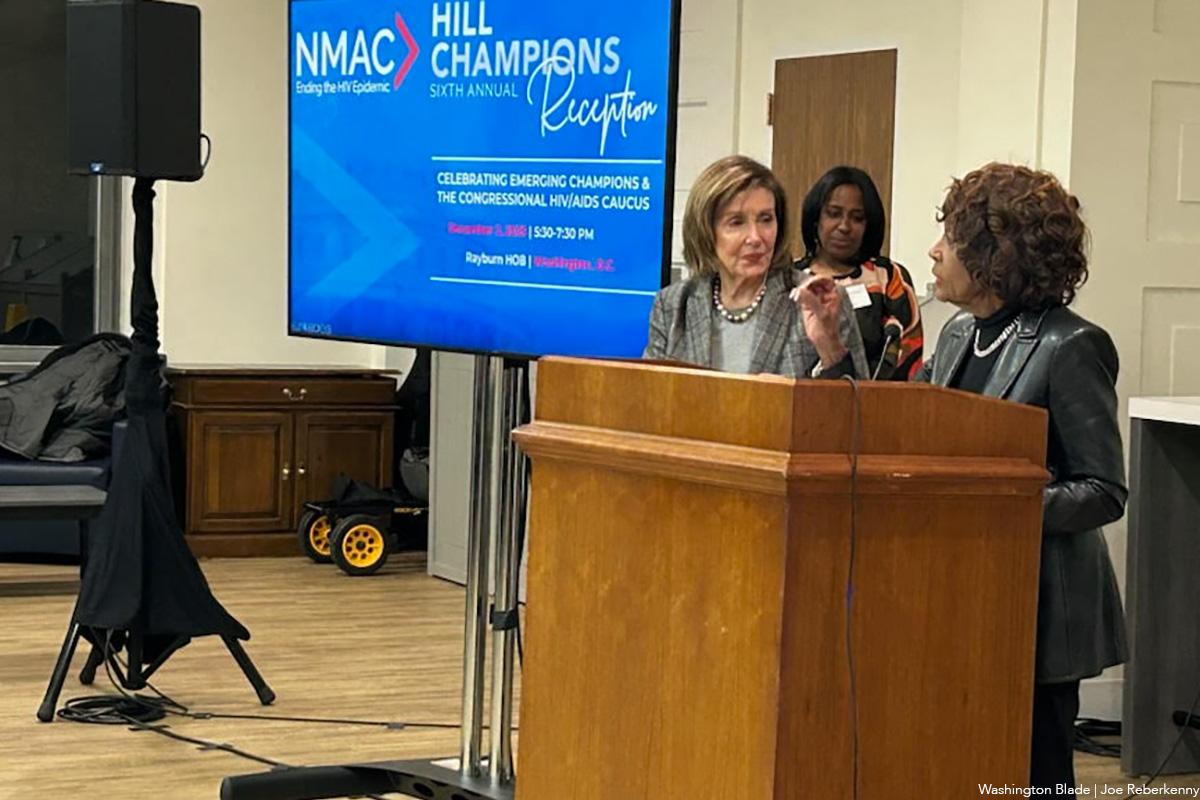
NMAC, formerly known as the National Minority AIDS Council, a nonprofit organization that works for health equity and racial justice to end the HIV epidemic, held its 6th annual Hill Champions reception on Wednesday in the Rayburn House Office Building to honor federal legislators who have worked to stop the spread of HIV/AIDS in the U.S. and around the world.
Currently there are an estimated 40.8 million people worldwide living with HIV, with about 1.2 million people in the U.S. with the disease. While there is no cure, there are highly effective treatments that can control the virus and allow people to live long, healthy lives called antiretroviral therapy that can reduce the amount of virus in the body to an undetectable level, which also prevents the spread of HIV to others.
This year, NMAC’s reception featured a slew of current policymakers who use their national platforms to push for expanding HIV funding in Congress. This year’s honorees were three congresswomen who are active voices for HIV/AIDS on the House floor: U.S. Reps. Jasmine Crockett (D-Texas), Sara Jacobs (D-Calif.), and Delia Ramirez (D-Ill.).
The awards presented to the representatives are named after three congressional icons who have dedicated their lives to ensuring the voices of the most marginalized are heard, seen, and helped.
Crockett received the John Lewis Good Trouble Award, Jacobs received the Barbara Lee Courage in HIV/Advocacy Award, and Ramirez received the Elijah Cummings Award for Minority Health Equity.
NMAC CEO Harold J. Phillips, the former director of the White House Office of National AIDS Policy under President Joe Biden, was one of the first to speak at the event. He congratulated the honorees, highlighted work accomplished this past year in the fight against HIV/AIDS, and outlined what lies ahead as the current president continues to slash funding for public health initiatives worldwide.
“Tonight, we gather to celebrate what’s possible when courage meets commitment, when leaders refuse to let politics stand in the way of saving lives, we’re in a critical moment. Political uncertainty threatens the very programs that have transformed HIV into a manageable condition, but a crisis creates an opportunity for collective action,” Phillips said. “For more than 40 years, the HIV movement has thrived because of bipartisan leadership, leaders who understood that public health transcends party lines. Now more than ever, we need advocates on the hill.”
He continued, spotlighting actions taken by the honorees for the HIV movement during a time when some of the highest officials in government refuse to acknowledge it.
“What unites these champions is their understanding that HIV advocacy is not political — it is moral. They show us what it looks like when leaders treat public health as a responsibility, not a bargaining chip.”
Jacobs and Ramirez attended in person, while Crockett, who was unable to be there, sent a video.
In her speech after receiving the Barbara Lee Courage in HIV/Advocacy Award, Jacobs emphasized that the policies and initiatives put forward through the HIV Caucus and public health organizations in the U.S. have global impact — particularly regarding PEPFAR. Jacobs has been a consistent champion for people living with HIV, military service rights, and protecting the U.S. Agency for International Development.
“PEPFAR has saved over 25 million lives, but cuts are already causing catastrophic setbacks,” Rep. Jacobs said, explaining that even with progress made due to PEPFAR funding, places like Malawi reaching the 95-95-95 goal (95 percent of all people with HIV knew their status, 95 percent of those diagnosed were on lifesaving antiretrovirals, and 95 percent of those on medication were unable to transmit HIV) will continue to suffer. “In Malawi, where services for LGBTQ people, sex workers, young women, and other marginalized groups have been eliminated, it’s no longer a question of if transmission rates will rise — but when. We cannot leave communities behind or allow preventable deaths because of political decisions made in Washington.”

“I know that people of color, immigrants and trans people, have all been let down by our mainstream approach to HIV prevention and everything, I see seven barriers they face in accessing health care, the stigma surrounding disease and the lack of awareness from people in power,” the San Diego congresswoman said. “I want to say to those in that community, I will not let you fall through the cracks. I will not let you become another statistic, and I will keep working to make sure your voice is heard and that you can live a full and healthy life.”
Crockett, who addressed the crowd via video, emphasized her award’s namesake, explaining that the “good trouble” she gets into on the House floor and in committees can be deemed too much even by those in her own party, but that she remains committed to making HIV treatment accessible to all, regardless of background.
“To receive an award named after John Lewis is an honor all on its own. It means being bold, speaking up when others are scared to and standing firm when the truth makes people uncomfortable. And y’all know me — I don’t mind stirring a little trouble, especially when I am stirring trouble that is good trouble — but I never do it alone. I do it with the strength of the communities I represent. I do it with the stories of the folks who feel unheard. I do it for the people who depend on someone in those halls of Congress to fight for them. So this award isn’t just mine. It belongs to every advocate pushing for access to health care, every person navigating their own health journey, every organizer who refuses to give up.”
She continued, without directly calling out the White House, making allusions to pushing back against the recent emergence of budget cuts.
“I promise to keep fighting for funding, for research, for resources ,and for every community that needs a champion, because getting into good trouble isn’t just a phrase, it’s a calling, a calling we all share in this room,” Crockett said. “Thank you again for this honor, and thank you for your leadership, your fight and your refusal to back down. Now, let’s keep getting into that good trouble.”
Ramirez, who represents a part of Chicago, was previously in the Illinois House of Representatives, where she co-sponsored legislation to allow minors to access HIV and STI testing, prevention, and treatment without parental consent. She was also a chief co-sponsor in securing $10 million in state funding for this initiative in Illinois, and was the House chief co-sponsor for the “disrupting disparities for LGBTQ+ older adults and older adults living with HIV” initiative.
“I am clear more than ever that a commitment to ending the HIV and AIDS epidemic must continue to be our priority, and we must demonstrate that priority not through words, my friends, but through action — fighting for and protecting our neighbors, living with HIV or AIDS, including our LGBTQI plus neighbors,” Ramirez said. “It means showing up, telling our stories, celebrating each other and fighting side by side for that collective liberation, which only makes me more grateful for the people in this room.”
She also used the platform to criticize how some of Trump-Vance administration’s cuts to healthcare coverage funding were directed at underserved communities within the U.S. — namely undocumented immigrants like her parents.
“I want you to know that as members of Congress, we cannot go through day to day as business as usual, today is the time to demand that our siblings living with HIV and AIDS, no matter their sexual orientation, no matter their gender expression, no matter their zip code, their background or their citizenship status, that they get everything that they deserve, every Damn thing, so that they can live a healthy and thriving life.”
While the event was intended to celebrate the accomplishments of legislators, advocates, and supporters of the fight against HIV/AIDS, the tone of the night was noticeably more charged following the Trump-Vance administration’s refusal to acknowledge World AIDS Day — and the reported directive instructing federal employees not to comment about it on any channels, including social media and traditional media.
Speaker Emerita Nancy Pelosi (D-Calif.) made a surprise appearance, celebrating the three legislators while emphasizing the critical importance of supporting HIV/AIDS research now that the White House has refused to acknowledge it.
“It’s really important this year, because this is the first time in a very long time that we have had World AIDS Day when the president of the United States has said, we can’t really talk about it and we certainly should not observe it for two days. On Sunday and Monday in San Francisco, we did exactly that. We talked about it, and we observed it, and here we are talking about it here, because, as Congressman Crockett said, and we all know, we’re here to fight for funding. We’re fighting for research, prevention, and all of that, but we’re also here to fight against discrimination and stigma anybody wants to attach to this, and that starts with you in the White House,” Pelosi said. “We have a fight on our hands, because this isn’t over.. [to] make sure that any discussion of HIV ends up in the dust bin of history, an ancient malady when our children, grandchildren all grow up. ‘What was that?’ It was something that doesn’t exist anymore because of the goodness of others, because of the National Minority AIDS Council.”
Maxine Waters slams Trump
U.S. Rep. Maxine Waters (D-Calif.) also made an appearance and delivered an unfiltered, passionate speech praising NMAC’s efforts and calling out Trump for ending funding for HIV/AIDS worldwide while simultaneously accepting donations to rebuild the White House as he sees fit.
“I want to tell you when they asked, how was I doing when I came in, really, I was thinking about the president of the United States and what’s going on now, it’s so troubling. And I find myself not sleeping as well as I normally sleep. I find myself trying to believe that what I see is happening is absolutely happening,” Waters said. “Many of our people with HIV and AIDS are homeless, and they’re not being taken care of, and they’re going to die with the cuts that are being made. Unfortunately, we just got to say it.”
She continued, calling out Trump’s lack of focus on domestic issues like HIV/AIDS that directly impact American citizens, instead prioritizing issues unrelated to the public’s welfare.
“The fact that the president of the United States is killing people in international waters in Venezuela, not knowing whether or not they’re drug dealers or not, not caring, and I think about two people, two men hanging on the side of the boat who had escaped the bomb that hit, and they said, kill him, and they shot him down and killed it’s hard to live with this. It’s hard to understand how all of this is happening. And so Trump refused to commemorate World AIDS Day, and his State Department instructed employees and grantees to refrain from publicly promoting World AIDS Day through any communication channels, including social media, media engagements, speeches or other public facing messaging let’s just be an honorary Why would he be focused on us celebrating or working with World AIDS Day and helping people to understand that HIV and AIDS is still a big problem in this country, and we have to spend money. We have to do what it takes in order to provide the medicine and the health care that they need. Why would he just be against that? He’s already cutting the funds. But just go even further and say and don’t even promote World AIDS Day. It’s bothersome. Trump halted funds for PEPFAR, the President’s Emergency Plan for AIDS Relief, which was created under the leadership of former Congresswoman Barbara Lee, the co-founder of the Congressional HIV AIDS Caucus.”
“There’s a very rich man that paid attention to what was going on with HIV and AIDS, and that was Bill Gates. And I’d like to quote him and what he said. ‘We’re already seeing the tragic impact of reductions in aid, and we know the number of date deaths will continue to rise.’ Here in the United States, where Nancy and I just talked about the creation of Minority AIDS Initiative to address AIDS disparities, and where the initiative has grown from 156 million when we first started in 1999 to more than 400 million per year. Today, Donald Trump is waging an all out war on people living with HIV. Trump’s budget proposal completely eliminated HIV prevention funding at the Centers for Disease Control and Prevention, and he slashed the funds from Ryan White AIDS care and HIV research. We cannot allow, we cannot allow these devastating cuts to be implemented, and so we’re doing everything that we possibly can to fight Donald Trump on all of these issues. I want you to know that this attack on many of our friends who happened to come from other countries is just outrageous, and what he said about Somalia today just cannot be understood or accepted. And so for all of the nice people in the room, get mad, get angry. Do a little cursing. Tell people what you think about it, because if you’re too nice, nobody believes you. You got to kick a little butt. You got to make sure that they understand we’re in this fight and we’re not going to go away. I know he’s the president of the United States, but he shouldn’t be. He’s the president of the United States with a cabinet that knows nothing and cares nothing about anybody. I dare anybody to talk about minorities and want to know whether or not we’re qualified. Hell, they have the most unqualified people that you’ve ever witnessed in your life, anytime, anyplace, anywhere. We want to get rid of all of them dealing with this public policy, doing everything that we can, educating people. Don’t forget, you got to get them to vote.”
She spoke for 17 minutes, touching on many current events but repeatedly returning to the point that the president is supposed to represent the people — not his own interests.
“I came here to talk about AIDS, but I wasn’t going to let you go without talking about some other stuff too. And I’m going to leave you with saying, not only are we concerned and we’re upset about the kind of cuts that are made, whether we’re talking about health care, we’re talking about AIDS in particular, whether we’re talking about Section Eight, whether we’re talking about food stamps, this crazy man is destroying the White House — bulldozes the East Wing. Why would he do that? And why would he spend over $300 million to do that while he’s cutting all of these programs? Well, he’ll say it’s being donated. Well, get it donated to AIDS. You know what I’m saying. Why are you getting it donated? And then, last of all, which pisses me off, you. Definitely, and I just think it’s crazy and outrageous. He wants to take the John F. Kennedy Center and name it after Melania. What the hell?”
In a moment when federal silence grows louder, the advocates in that room offered a counterpoint — a reminder that community, courage, and persistence still drive the fight to end HIV.
Maine
Maine governor opens LGBTQ+ Victory Institute’s D.C. conference
Janet Mills successfully challenged White House’s anti-trans athlete executive order
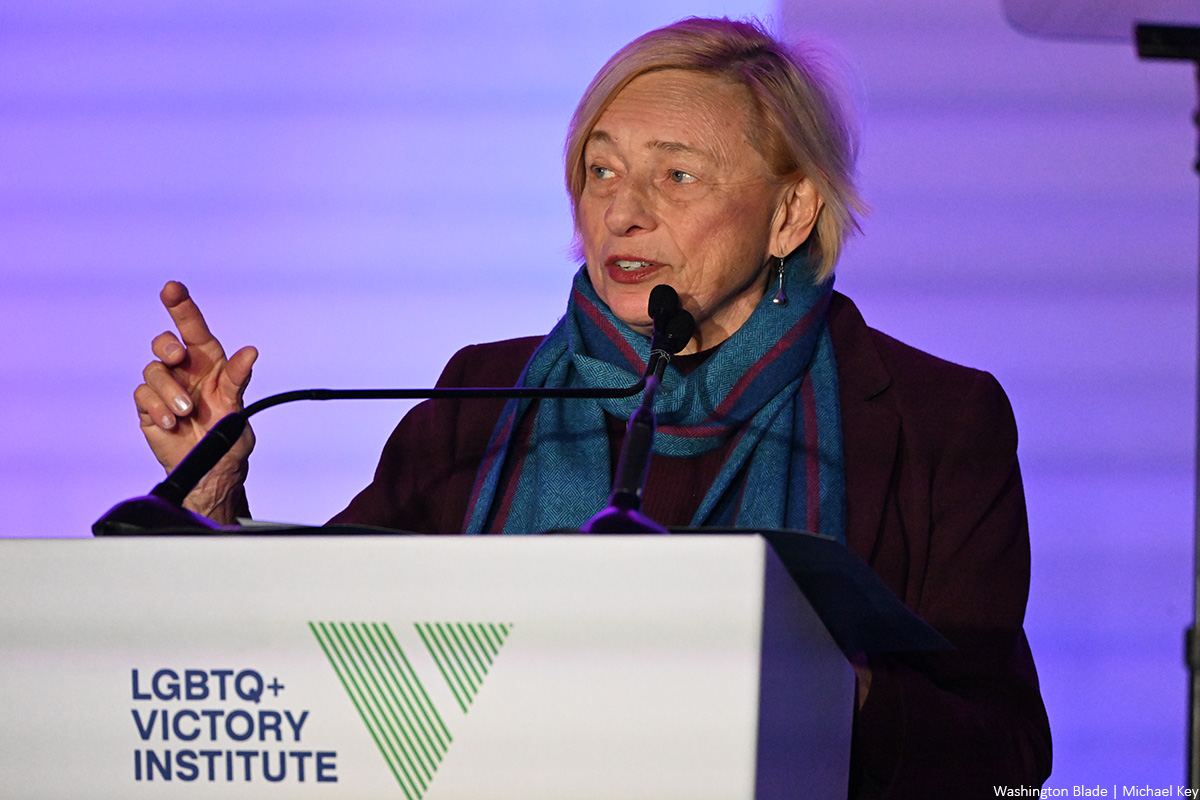
Maine Gov. Janet Mills on Thursday opened the LGBTQ+ Victory Institute’s annual International LGBTQ+ Leaders Conference in D.C.
Mills noted her February confrontation with President Donald Trump in the Oval Office over his executive order that bans transgender athletes from participating in school sports teams consistent with their gender identity.
Maine sued the Trump-Vance administration after it withheld federal funds to the state’s Department of Education. A federal judge ordered the White House to unfreeze the money.
“I speak as someone who, yeah, stood up to the president of the United States, to his face, when Donald Trump demanded that Maine violate our own laws to discriminate against transgender youth,” said Mills. “I told him I’d see him court. And guess what? We did see him in court and we won.”
Mills in October announced she is challenging incumbent U.S. Sen. Susan Collins (R-Maine).
Puerto Rico
Puerto Rico’s largest LGBTQ organization struggling amid federal funding cuts
Waves Ahead lost two grants from Justice Department, HUD

A loss of federal funds has forced Puerto Rico’s largest LGBTQ organization to scale back its work on the island.
Waves Ahead earlier this year lost upwards of $200,000 for a restorative justice program that the Justice Department funded through a three-year grant.
The U.S. Department of Housing and Urban Development has also rescinded a $170,000 annual grant that Waves Ahead used to sustain Soraya’s House, a transitional housing program for LGBTQ people in Cabo Rojo, a municipality in Puerto Rico’s southwest coast. Puerto Rico’s Women’s Advocate Office, known by the acronym OPM, earlier this year also denied Waves Ahead’s application to receive more funding for its work to combat anti-LGBTQ violence.
OPM distributes STOP (Services, Training, Officers, and Prosecutors) Violence Against Women Formula Program funds it receives from the Justice Department to grant recipients in Puerto Rico.
Waves Ahead Executive Director Wilfred Labiosa during an interview with El Nuevo Día, a Puerto Rican newspaper, last month said his organization between October 2023 and January 2025 received more than $110,000 from OPM. (The Trump-Vance administration took office on Jan. 20. Puerto Rico Gov. Jenniffer González Colón, a Republican who supports President Donald Trump, took office on Jan. 2.)
Labiosa during an interview with the Washington Blade said Waves Ahead has lost 60 percent of its total budget.
The cuts have forced Waves Ahead to close its community center in Loíza, a municipality that is roughly 20 miles east of San Juan, the Puerto Rican capital. Waves Ahead has also had to curtail its restorative justice program that it operates with the Puerto Rico Cultural Center in Chicago.
Community centers continue to operate in San Juan, Cabo Rojo, Maunabo, and Isabela.
“People were really gaining a lot of skills. People were really involved,” Labiosa told the Blade.
“That was just pulled like a big band-aid right off the skin,” he said, referring to when he learned the Justice Department had rescinded the grant.
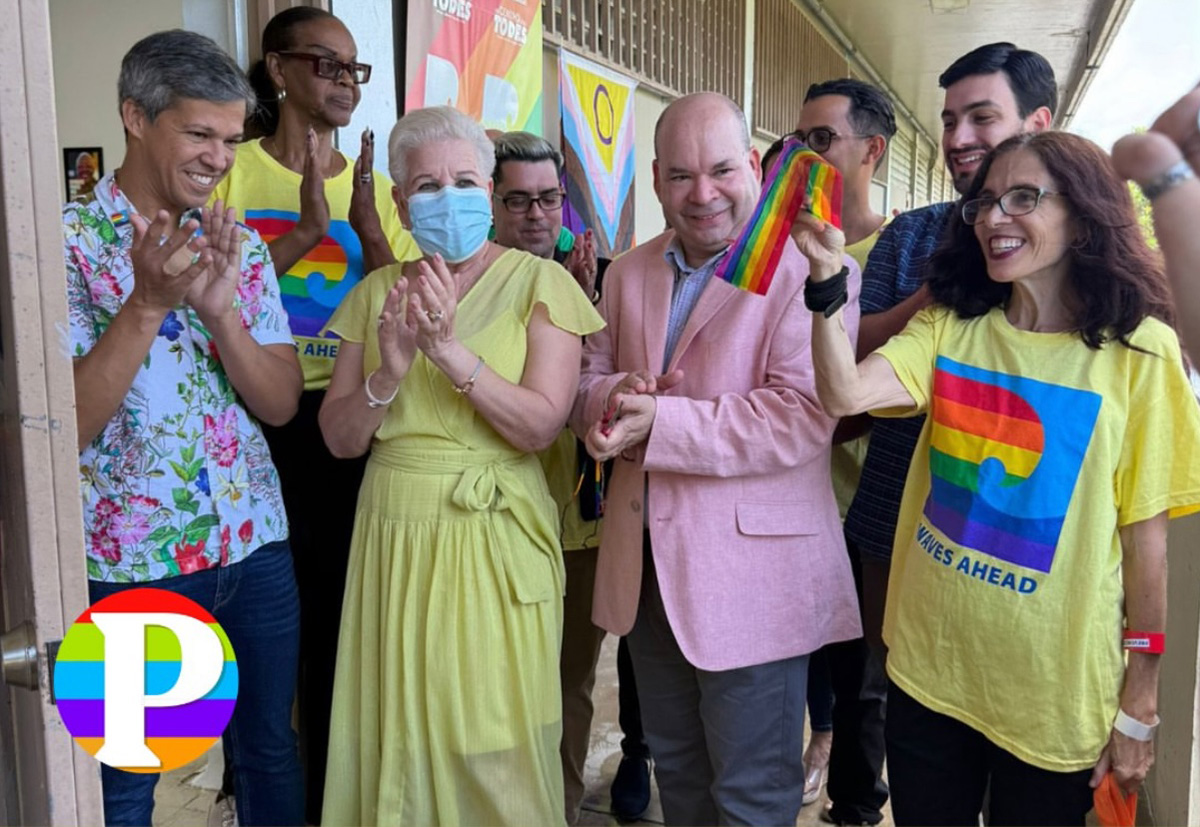
Waves Ahead Executive Director Wilfred Labiosa and volunteers bring food, water and other relief supplies to Iluminada, an 86-year-old resident of Vieques, Puerto Rico, on Jan. 31, 2018. Hurricane Maria a few months earlier devastated the U.S. commonwealth. (Washington Blade video by Michael K. Lavers)
Labiosa told the Blade the White House’s anti-LGBTQ policies and stance against diversity, equity, and inclusion programs likely contributed to the loss of federal funds.
He noted Waves Ahead lost its HUD funding, even though it was “on the list.”
“People here in Puerto Rico started to receive all the award letters, and all of a sudden we didn’t receive ours,” said Labiosa.
He told the Blade that Waves Ahead is one of two HUD grant recipients in Puerto Rico with LGBTQ-specific language in their profile, but “it is the only organization that has its mission and programming focused on LGBT homeless and people who needed transitional housing.”
“When we approached HUD and approached the local agent of HUD here … they all said, oh, we’re not sure what happened,” said Labiosa. “We tried to meet with everybody involved, but HUD never gave us a phone call. They just sent us an email saying you didn’t answer this question. The question was answered. It was something pitiful.”
Neither HUD nor the Justice Department have responded to the Blade’s request for comment.
Waves Ahead, meanwhile, has turned to the Puerto Rican diaspora in the mainland U.S. and private foundations for support. Labiosa noted local organizations and businesses have also given Waves Ahead money.
Waves Ahead on Giving Tuesday raised $2,778.
“We continue hands on and moving forward,” said Labiosa.
-

 The White House2 days ago
The White House2 days ago‘Lavender Scare 2.0’: inside the White House’s campaign against LGBTQ federal employees
-

 District of Columbia4 days ago
District of Columbia4 days agoHIV/AIDS activists block intersection near White House
-

 District of Columbia2 days ago
District of Columbia2 days agoActivists praise Mayor Bowser’s impact on city, LGBTQ community
-

 a&e features1 day ago
a&e features1 day agoMeet Mr. Christmas





